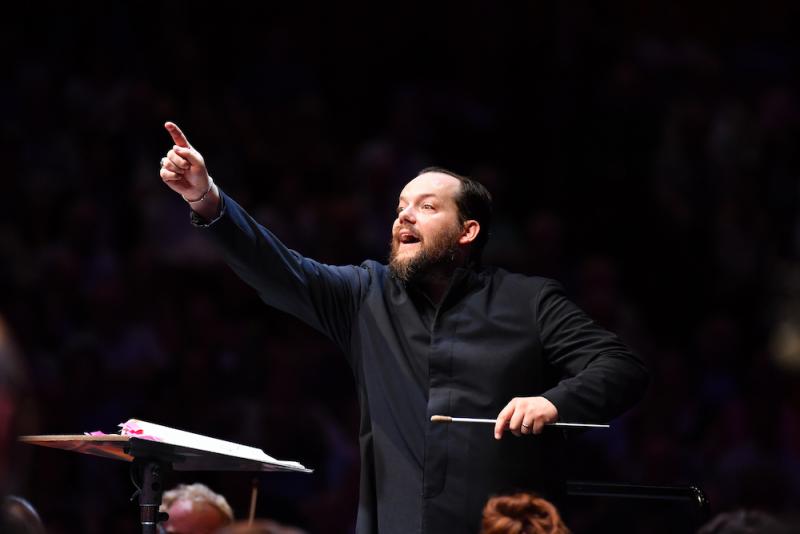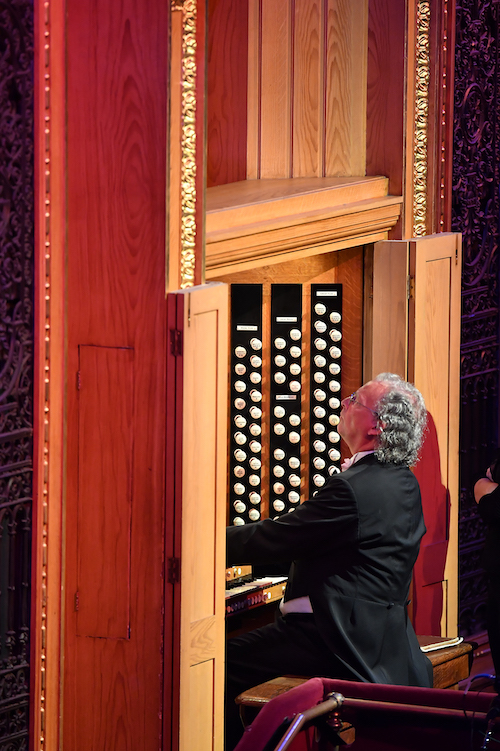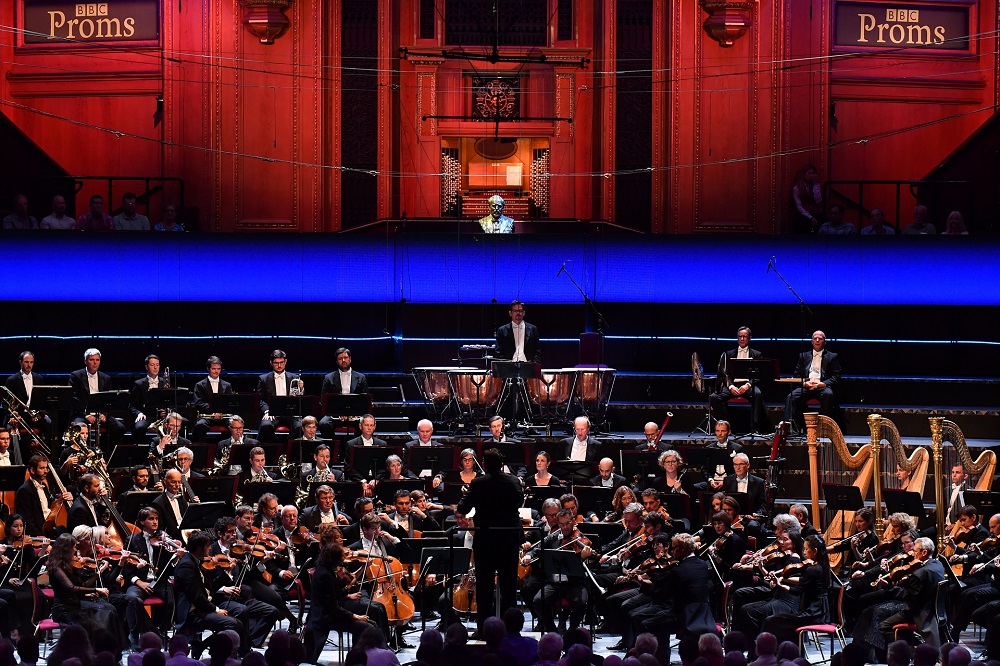Prom 47: Schönheit, Leipzig Gewandhaus, Nelsons review - Bruckner doesn’t quite take flight | reviews, news & interviews
Prom 47: Schönheit, Leipzig Gewandhaus, Nelsons review - Bruckner doesn’t quite take flight
Prom 47: Schönheit, Leipzig Gewandhaus, Nelsons review - Bruckner doesn’t quite take flight
Ravishing sounds from thoroughbred Germans, undermined by sluggish tempos

After Thursday night’s concert I celebrated the Proms’ exploration of unfamiliar repertoire via the CBSO. The following evening saw the festival diving back into mainstream repertoire – as it must also do – conducted by the CBSO’s previous music director.
Before we got to Bruckner we had some Bach organ music, played on the Albert Hall’s mighty instrument by the Leipzig Gewandhaus’s resident organist (since 1984) Michael Schönheit (pictured below). He presented five pieces, making the half-hour first half into a mini-recital. It is somewhat strange, in the age when symphony orchestras don’t play Bach any more, leaving it to leaner, lighter period instrument groups, to hear the organ music belted out of such a massive beast.
 Where it worked was in the declaratory Fantasia BWV542 that opened and the giant Fugue in E flat BWV552 that closed. Where it was less successful was in the arrangements of the cantata movements known best in this country as “Jesu, Joy of Man’s Desiring” and “Sleepers, Wake!”, which felt too heavy. Also, the rhythmic unevenness in the flowing lines of both, presumably deliberate, made the music less lissom and graceful, and I missed the nuance of the originals. But for all the peculiar untheatricality of the audience gazing at an empty stage, with only a bobbing head above it for people to look at, Michael Schönheit can probably lay claim to being the only performer this season to have definitely been heard by everyone in the hall.
Where it worked was in the declaratory Fantasia BWV542 that opened and the giant Fugue in E flat BWV552 that closed. Where it was less successful was in the arrangements of the cantata movements known best in this country as “Jesu, Joy of Man’s Desiring” and “Sleepers, Wake!”, which felt too heavy. Also, the rhythmic unevenness in the flowing lines of both, presumably deliberate, made the music less lissom and graceful, and I missed the nuance of the originals. But for all the peculiar untheatricality of the audience gazing at an empty stage, with only a bobbing head above it for people to look at, Michael Schönheit can probably lay claim to being the only performer this season to have definitely been heard by everyone in the hall.
The connection between the first and second half – beyond Bach’s connection to Leipzig – is that Bruckner was a virtuoso organist and indeed, in 1871, gave a recital series at the newly opened Albert Hall. His music shares Bach’s seriousness of intent and sense of the numinous, although in the expansiveness of his musical development he is in a different world from the quicksilver Bach.
Bruckner’s Eighth Symphony is massive, it goes without saying. It is a feat of concentration for players and audience alike, and for a conductor a test of large-scale control. The deliberate pace at which events unfurl – and at times I felt the swearing-in-a-cathedral urge to shout “Get on with it!” – means the music needs to get out of a low gear when it can. Here I felt Andris Nelson’s slow (in the case of the second movement) and very slow (in the case of the third) tempos undermined the forward momentum of the piece, and kept it earthbound. The third movement sounded ravishing, but at over 27 minutes was just indulgent. 
rating
Explore topics
Share this article
Add comment
The future of Arts Journalism
You can stop theartsdesk.com closing!
We urgently need financing to survive. Our fundraising drive has thus far raised £49,000 but we need to reach £100,000 or we will be forced to close. Please contribute here: https://gofund.me/c3f6033d
And if you can forward this information to anyone who might assist, we’d be grateful.

Subscribe to theartsdesk.com
Thank you for continuing to read our work on theartsdesk.com. For unlimited access to every article in its entirety, including our archive of more than 15,000 pieces, we're asking for £5 per month or £40 per year. We feel it's a very good deal, and hope you do too.
To take a subscription now simply click here.
And if you're looking for that extra gift for a friend or family member, why not treat them to a theartsdesk.com gift subscription?
more Classical music
 Kohout, Spence, Braun, Manchester Camerata, Huth, RNCM, Manchester review - joy, insight, imagination and unanimity
Celebration of the past with stars of the future at the Royal Northern College
Kohout, Spence, Braun, Manchester Camerata, Huth, RNCM, Manchester review - joy, insight, imagination and unanimity
Celebration of the past with stars of the future at the Royal Northern College
 Jansen, LSO, Pappano, Barbican review - profound and bracing emotional workouts
Great soloist, conductor and orchestra take Britten and Shostakovich to the edge
Jansen, LSO, Pappano, Barbican review - profound and bracing emotional workouts
Great soloist, conductor and orchestra take Britten and Shostakovich to the edge
 Jakub Hrůša and Friends in Concert, Royal Opera review - fleshcreep in two uneven halves
Bartók kept short, and a sprawling Dvořák choral ballad done as well as it could be
Jakub Hrůša and Friends in Concert, Royal Opera review - fleshcreep in two uneven halves
Bartók kept short, and a sprawling Dvořák choral ballad done as well as it could be
 Hadelich, BBC Philharmonic, Storgårds, Bridgewater Hall, Manchester review - youth, fate and pain
Prokofiev in the hands of a fine violinist has surely never sounded better
Hadelich, BBC Philharmonic, Storgårds, Bridgewater Hall, Manchester review - youth, fate and pain
Prokofiev in the hands of a fine violinist has surely never sounded better
 Monteverdi Choir, ORR, Heras-Casado, St Martin-in-the-Fields review - flames of joy and sorrow
First-rate soloists, choir and orchestra unite in a blazing Mozart Requiem
Monteverdi Choir, ORR, Heras-Casado, St Martin-in-the-Fields review - flames of joy and sorrow
First-rate soloists, choir and orchestra unite in a blazing Mozart Requiem
 Cho, LSO, Pappano, Barbican review - finely-focused stormy weather
Chameleonic Seong-Jin Cho is a match for the fine-tuning of the LSO’s Chief Conductor
Cho, LSO, Pappano, Barbican review - finely-focused stormy weather
Chameleonic Seong-Jin Cho is a match for the fine-tuning of the LSO’s Chief Conductor
 Classical CDs: Shrouds, silhouettes and superstition
Cello concertos, choral collections and a stunning tribute to a contemporary giant
Classical CDs: Shrouds, silhouettes and superstition
Cello concertos, choral collections and a stunning tribute to a contemporary giant
 Appl, Levickis, Wigmore Hall review - fun to the fore in cabaret and show songs
A relaxed evening of light-hearted fare, with the accordion offering unusual colours
Appl, Levickis, Wigmore Hall review - fun to the fore in cabaret and show songs
A relaxed evening of light-hearted fare, with the accordion offering unusual colours
 Lammermuir Festival 2025, Part 2 review - from the soaringly sublime to the zoologically ridiculous
Bigger than ever, and the quality remains astonishingly high
Lammermuir Festival 2025, Part 2 review - from the soaringly sublime to the zoologically ridiculous
Bigger than ever, and the quality remains astonishingly high
 BBC Proms: Ehnes, Sinfonia of London, Wilson review - aspects of love
Sensuous Ravel, and bittersweet Bernstein, on an amorous evening
BBC Proms: Ehnes, Sinfonia of London, Wilson review - aspects of love
Sensuous Ravel, and bittersweet Bernstein, on an amorous evening
 Presteigne Festival 2025 review - new music is centre stage in the Welsh Marches
Music by 30 living composers, with Eleanor Alberga topping the bill
Presteigne Festival 2025 review - new music is centre stage in the Welsh Marches
Music by 30 living composers, with Eleanor Alberga topping the bill
 Lammermuir Festival 2025 review - music with soul from the heart of East Lothian
Baroque splendour, and chamber-ensemble drama, amid history-haunted lands
Lammermuir Festival 2025 review - music with soul from the heart of East Lothian
Baroque splendour, and chamber-ensemble drama, amid history-haunted lands

Comments
The audience displayed more
I don't understand why you
Thanks for your feedback
Thanks for your feedback Derek. I did acknowledge the full house and enthusiastic reception in the review. (Although the Prommers seem to stamp as a matter of course these days.) And while I don‘t deny there are slower third movements around, a quick check of Idagio throws up, within the first few entries: Karajan 25’, Jansons 24’, Haitink 25’, Solti 25’ and Haenchen 21’(!). Best, Bernard
Bernard is on the money (if
Spot-on.
No great surprise that a 21st